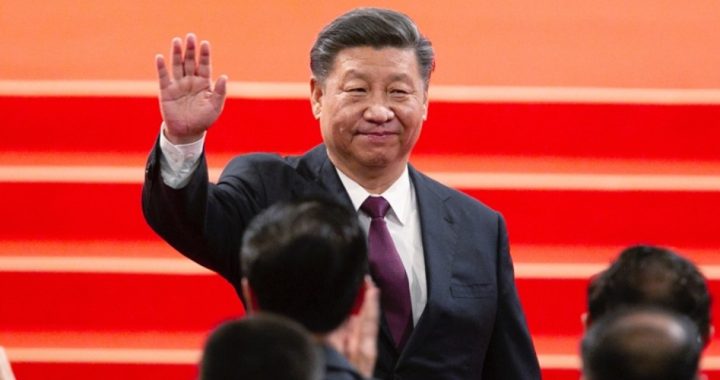
During last week’s meeting of the Chinese Communist Party’s Politburo, China’s President and General Secretary Xi Jinping received another title: “renmin lingxiu” or “People’s Leader,” an accolade reminiscent of that awarded China’s first communist dictator, Mao Tse-tung.
It was a political move, not strategic. Xi likely arranged for the sobriquet to be bestowed upon him as a message to any who harbored any concerns about where he was taking China. Ever since he had the government’s constitution amended in 2018 to make his position his as long as he wanted it, Xi has been the communist party’s “core” leader, the chairman of the party’s military commission, commander-in-chief of China’s armed forces, and head of the party’s committees overseeing the country’s economy and finances.
The mask is slipping. Under Mao’s successor, Deng Xiaoping, Beijing’s public persona had been to “hide our capacities and bide our time.” That “venus flytrap” included opening up the third-world country to trading with the west, especially the United States. This included promising not to interfere with entrepreneurs willing to invest in the country in order to access its cheap labor and encouraging their investment.
In 1978, China’s GDP was $10 billion a year. Today, it is $13 trillion.
And now the time has come for China to frontally challenge the United States as hegemon of the world.
As Michael Pillsbury, a foreign policy consultant and assistant under secretary of defense for policy planning during the Reagan administration, explained in his 300-page book The Hundred-Year Marathon: China’s Secret Strategy to Replace America as the Global Superpower, the U.S. government had made five fatal assumptions regarding China: 1) Engagement with the Chinese communists will bring their cooperation; 2) Under Deng’s invitations to U.S. entrepreneurs, China was now on the road to democracy; 3) China was a fragile flower that needed the watering of western capital to help it succeed in becoming a full-blown well-behaved member of the advanced nations of the world; 4) China, under Deng’s faux-sincere welcoming, really wanted to be “just like us”; and 5) China’s “hawks” were weak, that the “moderates” were in charge and they could be dealt with honorably.
It was all bunkum. In November 2018, former U.S. Treasury Secretary Henry Paulson said it was a lie:
There’s this … myth that some of us who worked to engage China thought it would become a Jeffersonian democracy, or espouse a liberal Western order.
We never thought that. We always knew the [Chinese] Communist Party would play a … dominant role.
As Jonathan Ward noted in his recently released book China’s Vision of Victory, “Mr. Paulson knew that American engagement with China would bring about a globally-empowered China and a globally empowered Chinese Communist Party.”
Paulson remains a member of the globalist Council on Foreign Relations (CFR), as does Robert Lightizer, President Trump’s trade representative working with the Chinese communists on his trade deal.
Replacing the United States as the hegemon of the world is now official Chinese policy, and has been since 2017. Xi’s official Xinhua News Agency said so: “By 2050, two centuries after the Opium Wars, which plunged the ‘Middle Kingdom’ into a period of hurt and shame, China is set to regain its might and re-ascend to the top of the world.”
With the Politburo’s rubber stamp, Xi is free to 1) address the Hong Kong riots with all the military force he deems necessary; 2) continue to oppress the Uighurs; 3) extend credits for more and more nations under his Belt and Road program; 4) deal with President Trump through his trade representative in such a way that any agreement doesn’t harm the primary objective of the creation of a new China that replaces the United States.
Xi, with complete control of the communist party’s apparatus, now is abrogating much of Deng’s initiatives that had turned China into an economic and military powerhouse. He is accelerating the country’s military buildup and continues to authorize the draconian repression of the Uighur Muslims in the western Xinjiang region. He continues to develop disputed offshore islands in the South China Sea claimed by Japan, turning them into military bases. He is free to threaten Taiwan with sanctions if the Taiwanese resist his overtures to absorb them into the Chinese orb.
He will continue to press his Belt and Road initiative, which Patrick Buchanan correctly termed “projects to tie China to Central and South Asia and Europe … only to take possession of the facilities when local regimes default on their [Chinese] loans.”
There is little likelihood of a change while Xi is in charge. With the help of people such as Paulson and Lighthizer and other globalists insinuated in the Trump administration, U.S. hegemony will continue to be threatened by the communists running the Chinese mainland.
Photo: AP Images
An Ivy League graduate and former investment advisor, Bob is a regular contributor to The New American, writing primarily on economics and politics. He can be reached at [email protected].
Related articles:
Will China’s Slowing Economy Force a Trade Deal With the U.S.?



